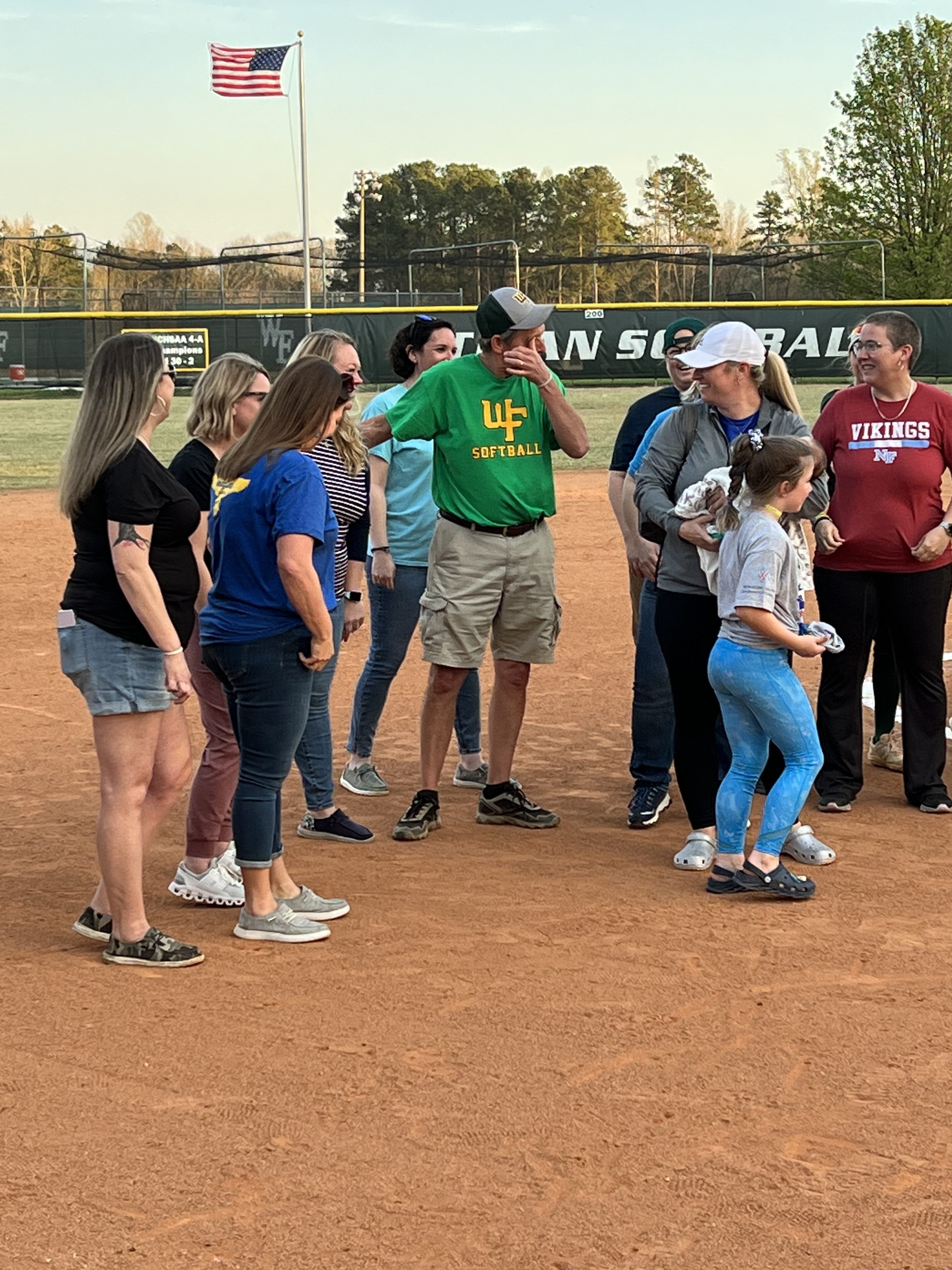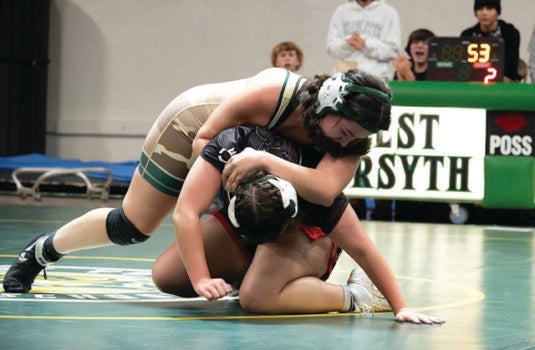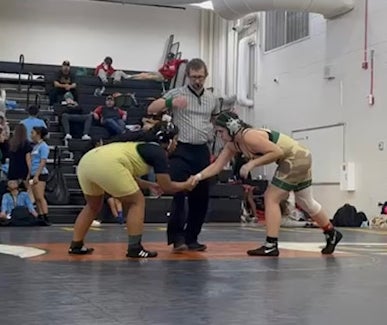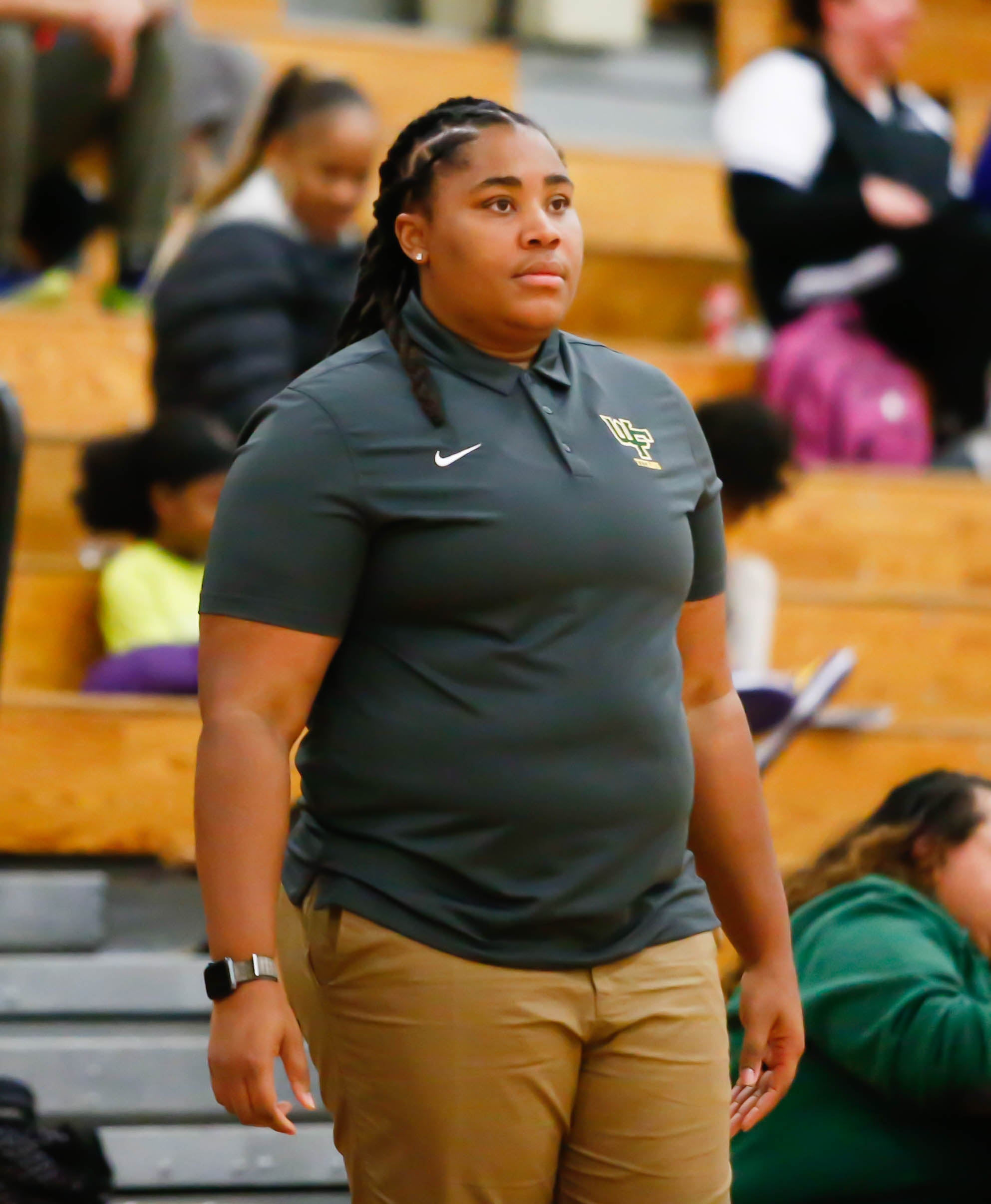Hips don’t lie: West Forsyth senior Kendall Pridgen overcame childhood adversity to being a top-notch wrestler
Published 12:00 am Thursday, January 11, 2024
|
Getting your Trinity Audio player ready...
|
By Jay Spivey
For the Clemmons Courier
Kendall Pridgen grew up playing several different sports, there was just one problem. She was born with hip dysplasia and had to wear a brace for much of her childhood.
Now a senior on the West Forsyth girls wrestling team, as well as a member of the track-and-field team, she has more than conquered her hip dysphasia.
According to mayoclinic.org, hip dysplasia is “the medical term for a hip socket that doesn’t fully cover the ball portion of the upper thighbone,” which “allows the hip joint to become partially or completely dislocated.”
Pridgen, the daughter of Brent and Kelly Pridgen, competed in gymnastics as a child, played basketball recreationally and in AAU, and played softball at West Forsyth her freshman year and girls lacrosse at West Forsyth until her junior year. She started wrestling last season, the first season girls wrestling had been sanctioned in the NCHSAA, and she also started throwing the discus and shot put on the indoor and outdoor track-and-field teams at West Forsyth. She also has a 15-year-old brother named Brenner, who is a freshman at Reagan.
“I think it’s like one in a thousand kids have it,” Pridgen said of having hip dysplasia. “So, when I was born, the balls of your hips are supposed to be at about a 35ish-degree angle. Mine were pointed outward. And so, I wasn’t able to walk properly. And so, I had to wear a brace.”
Although Pridgen has always been athletic, she had to acclimate herself to the brace.
“It changed the way I ran,” she said. “I struggled to walk in a straight line. And sometimes my feet are uneven when I stand.”
Pridgen said she wore the brace until she was 5 or 6.
“I had to go in for yearly appointments until I was, I think, either somewhere between 6 and 7. And then they said they wanted to give me a few years to heal, so I had my final checkup appointment last year.”
Growing up is awkward enough. Pridgen had it compounded because of the brace.
“I didn’t have to wear the brace like during school in elementary school,” she said. “But sometimes when I ran, it was kind of lopsided, so it made doing more physical sports hard. Growing up, I wanted to be like the next Gabby Douglas (American gymnast), like I was doing gymnastics until I was 5 and 6.
“And so, it made it really difficult to do some tumbling stuff. So, I was like, ‘This is not the sport for me.’ And so, that’s when I ended up picking up softball and basketball.”
Despite her travails, Pridgen just kept trudging along.
“I wouldn’t say emotionally really as much physically,” she said of dealing with her own pain, as well as strangers eyeing her. “I have to learn to run really while playing elite soccer. I was learning how to run, and still, to this day, I am not a fast runner. I cannot run to save my life.”
Enter girls wrestling, which was not only new to her, it was new to North Carolina.
“That’s why I chose a sport there is no running in,” Pridgen said. “I would say somewhat (picked on) just for the way I moved around. But it didn’t really bother me.”
Before going out for wrestling last season, Pridgen knew nothing about the sport.
“I watched WWE growing up,” she said. “That’s not real. I didn’t come into it knowing a whole, whole bunch, really.”
The sport of wrestling appealed to Pridgen, and once it was announced that it was going to be a sanctioned sport, she dived right into it.
“I showed up every single day for two hours a day,” she said. “I lifted weights in the morning before I went to school. And then I even got some of my closest friends involved, too.”
When girls wrestling began, Jason Hooker was both the boys and girls wrestling coach at West Forsyth. Hooker resigned after last season.
“It’s much harder than it looks,” Pridgen said. “It’s much more time-consuming. It’s harder mentally, physically. I don’t think women’s (wrestling) gets talked about as much simply because it’s been such a male-dominated sport for so long. But even some of the girls I’ve wrestled, the guys I’ve wrestled, they’re equally as hard. Sometimes the girls are even harder.
“I just don’t think girls get enough credit for how much they do inside the sport, as well.”
Timmy Allen is now the boys wrestling coach and Tony Hairston, who was mostly an assistant on the boys team last season, is the girls coach.
“Last year, I wasn’t around the girls a whole lot because of the job I had at the time,” Hairston said. “So, I probably saw them wrestle twice in the whole year last year. So, I really didn’t have a huge opinion of any of them. But going into this year, knowing (Pridgen’s) a senior. She did wrestle last year, so she’s meeting all the expectations I had because she has the third-best record on the team.
There has actually been a positive for her hip dysplasia.
“The only benefit, the biggest benefit that’s come out of it is I’m really, really flexible, which helps with wrestling,” Pridgen said. “It’s really hard for people to turn you over and get a pin off it if I’m bottom because I can get my hips way low to the ground, making it harder to turn me over.”
Pridgen weighs between 160-165 pounds, but she wrestles up a weight class, wrestling at 185. Pridgen and Jadyn Magallanes are about the same weight, but Magallanes wrestles at her weight because Pridgen said Magallanes is quicker than she.
“It kind of fills out the team, and she says it’s easier for her because we have another young lady (Magallanes), and they weigh about the same,” Hairston said. “So, she made the choice to go up, and I appreciate her for doing it. She’s giving up close to 15 pounds. I know it’s hard on her.
It doesn’t seem to faze Pridgen.
“I would say it’s more beneficial for me because I have to be much stronger, and so it’s helping with throwing people down,” she said. “It’s making me stronger. It makes it easier for me.”
It all comes down to strategy for her.
“It gets very difficult if I get a take-down on me. It’s really hard to get up just because most of these girls are top-heavy,” Pridgen said. “And so, it’s really hard to get back up and get myself into a position where I can either stand up or get a switch off it. But I’m lighter, I’m quicker than most of them, which is why if I can get that first take-down, most of the time, I’ll end up getting that win.”
Strange to say, with all that Pridgen has been through physically, but she and Hairston use that to their advantage.
“Mainly, it’s a lot of stuff on her feet and just kind of, the ties, or tie-ups, and making sure we’ll call sprawls, which is defending the shots, and making sure her hip pressure is good,” Hairston said. “If her hip pressure is good then she’s not going to give up, it really doesn’t matter that weight, because she’s not only giving up weight but they’re also going to be just stronger.
“Because she’s able to compensate with that with her hip pressure because females are heavier in their hips versus boys. So, even though she’s wrestling girls her hip pressure will compensate for the weight and the strength, also.”
Wrestling season is coming down the home stretch and Pridgen’s career is coming to an end.
“This year, I’ve definitely gotten better skill-wise,” she said. “But with college applications and scholarships, and now financial aid opening up. And my own family and life outside of school, there’s been times it’s been difficult to focus on wrestling. But I simply love and adore my friends on the team and that coaching staff because they’ve always been able to find a way to help me out and get me where I need to be.”
The NCHSAA girls wrestling regionals are scheduled Feb. 2-3.
“She’ll make regionals,” Hairston said. “I’m hoping so (qualify for states). I’m hoping so. If she can get there anything can happen, good or bad.”
After wrestling is over, Pridgen will immediately focus on outdoor track and field. Pridgen knows, that because of her experience last year with her hip dysplasia, what is coming with the switch to another sport in the spring.
“Most of my pain comes when wrestling season is over and track has to start because wrestling, I have to put my hips inwards for a regular wrestling stance,” Pridgen said. “But the fact that they’re throwing, you have to open your body up and arch your back backwards…So, that was a drastic change in such a short time. It gave me a lot of pain last year.”
In addition to juggling sports in two different seasons, Pridgen, who has a 3.89 GPA, is a well-rounded student at West Forsyth. She’s in the National Honor Society, the state National Honor Society and the school’s key club.
One other thing. Pridgen, who is most likely to finish wrestling next month, is fully aware that she’ll be graduating in June. She said she’s applied to N.C. State, UNC Charlotte, Appalachian State, UNC Wilmington and North Carolina. She plans on majoring in psychology.
“I’d only be willing to wrestle in college because I know that wrestling isn’t something I can make a full-time job,” she said. “And to me I know it’s more important to focus on education than a sport.”
More Sports







